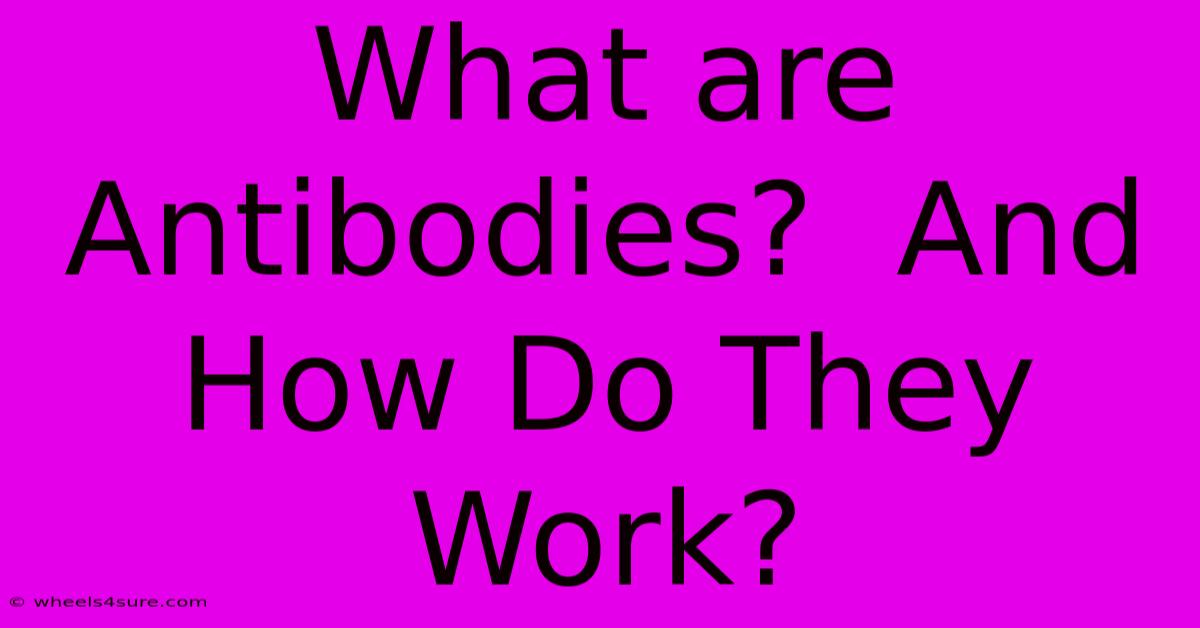What Are Antibodies? And How Do They Work?

Table of Contents
What are Antibodies? And How Do They Work?
Our bodies are constantly battling invaders – viruses, bacteria, fungi, and even parasites. Our immune system acts as our internal defense force, and a key part of that defense is antibodies. Understanding what antibodies are and how they work is crucial to understanding how our immune system protects us from disease.
What are Antibodies?
Antibodies, also known as immunoglobulins (Ig), are Y-shaped proteins produced by specialized white blood cells called plasma cells. These plasma cells are part of the B cell lineage, a type of lymphocyte, a crucial component of the adaptive immune system. The adaptive immune system is different from the innate immune system; it learns and remembers specific threats, allowing for a faster and more effective response upon re-exposure.
Antibodies are specifically designed to bind to antigens. Antigens are substances, often found on the surface of pathogens (disease-causing organisms), that trigger an immune response. Think of antigens as the "enemy" flags, and antibodies as the highly specialized missiles targeting those flags. Each antibody is incredibly specific, designed to recognize and bind to only one particular antigen, much like a key fits a specific lock.
There are five main classes of antibodies in humans, each with a slightly different role:
- IgG: The most abundant antibody in the blood, playing a key role in long-term immunity.
- IgM: The first antibody produced during an infection, often appearing early in an immune response.
- IgA: Found in mucosal secretions (like saliva, tears, and breast milk), protecting against pathogens entering the body through mucous membranes.
- IgD: Its function is still being actively researched, but it appears to play a role in B cell activation.
- IgE: Involved in allergic reactions and defense against parasites.
How Do Antibodies Work?
The primary function of antibodies is to neutralize pathogens and mark them for destruction. They achieve this through several mechanisms:
1. Neutralization:
Antibodies can bind to the surface of pathogens, blocking their ability to infect cells. This is like disabling the pathogen's "weapons" preventing them from causing harm. Think of it like covering the keyhole to prevent the key from entering.
2. Opsonization:
Antibodies coat the surface of pathogens, making them more easily recognizable and palatable to phagocytes. Phagocytes are cells that engulf and destroy pathogens. This process, known as opsonization, enhances phagocytosis, essentially flagging the enemy for destruction.
3. Complement Activation:
Antibodies can trigger the complement system, a cascade of proteins that further enhance pathogen destruction. This system leads to the formation of membrane attack complexes (MACs), which create holes in the pathogen's membrane, leading to its lysis (destruction). Imagine the antibodies calling for backup and initiating a coordinated attack.
4. Antibody-Dependent Cell-Mediated Cytotoxicity (ADCC):
Antibodies can bind to infected cells, marking them for destruction by natural killer (NK) cells. These NK cells then release cytotoxic molecules that kill the infected cells. It's like sending in specialized assassins to eliminate the infected cells.
The Importance of Antibodies
Antibodies are essential for our health and survival. They provide both short-term protection during an active infection and long-term immunity after the infection has been cleared. This long-term immunity is the foundation of vaccines, which work by inducing the production of antibodies against specific pathogens, preparing the body for a future encounter. Without antibodies, our bodies would be far more vulnerable to a wide range of infections.
Understanding antibodies and their mechanisms is a fundamental step in grasping the intricacies of the human immune system and developing effective strategies for preventing and treating diseases. Ongoing research continues to unveil more about the incredible complexity and power of these remarkable proteins.

Thank you for visiting our website wich cover about What Are Antibodies? And How Do They Work?. We hope the information provided has been useful to you. Feel free to contact us if you have any questions or need further assistance. See you next time and dont miss to bookmark.
Featured Posts
-
Carmen Montero Mundt Age Inspiring Women Everywhere
Apr 14, 2025
-
Aamir Khan Daughter Her Passion For Photography
Apr 14, 2025
-
Priyankara Pereras Son The Legacy Continues
Apr 14, 2025
-
Gary Sinises Son Cancer And The Power Of Family
Apr 14, 2025
-
Andre Ellis Inspired By The Strength Of Ruth
Apr 14, 2025
